Contents
This is list of archives in Hungary.
This is list of archives in Hungary.
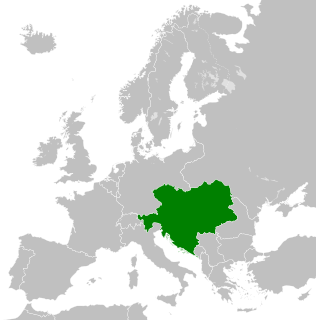
Austria-Hungary, often referred to as the Austro-Hungarian Empire or the Dual Monarchy, was a constitutional monarchy and great power in Central Europe between 1867 and 1918. It was formed with the Austro-Hungarian Compromise of 1867 and was dissolved shortly after its defeat in the First World War.

Czechoslovakia, or Czecho-Slovakia, was a sovereign state in Central Europe, created in October 1918, when it declared its independence from Austria-Hungary.

Hungary is a landlocked country in Central Europe. Spanning 93,030 square kilometres (35,920 sq mi) of the Carpathian Basin, it is bordered by Slovakia to the north, Ukraine to the northeast, Romania to the east and southeast, Serbia to the south, Croatia and Slovenia to the southwest and Austria to the west. Hungary has a population of nearly 10 million, mostly ethnic Hungarians and a significant Romani minority. Hungarian, the official language, is the world's most widely spoken Uralic language and among the few non-Indo-European languages widely spoken in Europe. Budapest is the country's capital and largest city; other major urban areas include Debrecen, Szeged, Miskolc, Pécs and Győr.
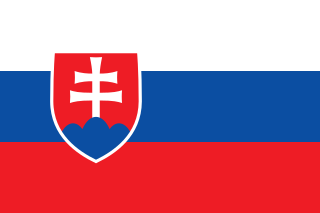
Slovakia, officially the Slovak Republic, is a landlocked country in Central Europe. It is bordered by Poland to the north, Ukraine to the east, Hungary to the south, Austria to the southwest, and the Czech Republic to the northwest. Slovakia's mostly mountainous territory spans about 49,000 square kilometres (19,000 sq mi), with a population of over 5.4 million. The capital and largest city is Bratislava, while the second largest city is Košice.

Budapest is the capital and most populous city of Hungary. It is the ninth-largest city in the European Union by population within city limits; the city has an estimated population of 1,752,286 over a land area of about 525 square kilometres. Budapest, which is both a city and county, forms the centre of the Budapest metropolitan area, which has an area of 7,626 square kilometres and a population of 3,303,786, comprising 33% of the population of Hungary.
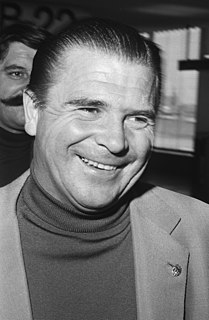
Ferenc Andrei Puskás was a Hungarian football player and manager, widely regarded as one of the greatest players of all time and the sport's first international superstar. A forward, he scored 162 goals in 123 international matches for Hungary, played four international matches for Spain and scored 514 goals in 529 matches in the Hungarian and Spanish leagues. He became an Olympic champion in 1952 and led his nation to the final of the 1954 World Cup. He won three European Cups, ten national championships and eight top individual scoring honors. In 1995, he was recognized as the greatest top division scorer of the 20th century by the IFFHS. With 806 goals in 793 official games scored during his career, he is the fourth top goalscorer of all time.
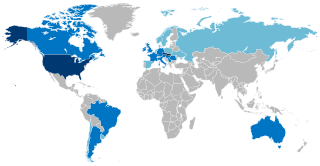
The Slovaks are a West Slavic ethnic group and nation native to Slovakia who share a common ancestry, culture, history and speak Slovak.
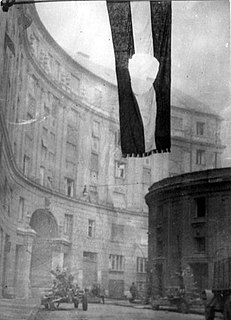
The Hungarian Revolution of 1956, was a countrywide revolution against the Stalinist government of the Hungarian People's Republic (1949–1989) and the Hungarian domestic policies imposed by the USSR. Initially anarchic, the Hungarian Uprising was the first major nationalist challenge to Soviet Union's control of Hungary since the Soviet Army ended the Nazi occupation of Hungary at the end of the Second World War in Europe, in May 1945.

Fidesz – Hungarian Civic Alliance is a right-wing populist and national-conservative political party in Hungary, led by Viktor Orbán.

The National Assembly is the parliament of Hungary. The unicameral body consists of 199 members elected to 4-year terms. Election of members is done using a hybrid system of parallel voting and compensation via transfer votes; involving single-member districts and one list vote; parties must win at least 5% of the popular vote in order to gain list seats assembly. The Assembly includes 25 standing committees to debate and report on introduced bills and to supervise the activities of the ministers. The Constitutional Court of Hungary has the right to challenge legislation on the grounds of constitutionality. The assembly has met in the Hungarian Parliament Building in Budapest since 1902.
The Hungary national football team represents Hungary in men's international football and is controlled by the Hungarian Football Federation. The team has made 9 appearances in the FIFA World Cup and 4 appearances in the European Championship, and plays its home matches at the Puskás Aréna, which opened in November 2019.

Viktor Mihály Orbán is a Hungarian politician who has served as prime minister of Hungary since 2010, previously holding the office from 1998 to 2002. He has presided over Fidesz, since 1993, with a brief break between 2000 and 2003.

The Hungarian Football Federation is the governing body of football in Hungary. It organizes the Hungarian league and the Hungarian national team. It is based in Budapest.
Elections in Hungary are held at two levels: general elections to elect the members of the National Assembly and local elections to elect local authorities. European Parliament elections are also held every 5 years.

Imre Schlosser was a Hungarian footballer of Danube Swabian ancestry who played as a forward. He still holds the record as the highest goalscorer in the history of the Hungarian National Championship.
The Nemzeti Bajnokság, also known as NB I, is the top level of the Hungarian football league system. The league is officially named OTP Bank Liga after its title sponsor OTP Bank. UEFA currently ranks the league 28th in Europe.
The Government of Hungary exercises executive power in Hungary. It is led by the Prime Minister, and is composed of various ministers. It is the principal organ of public administration. The Prime Minister (miniszterelnök) is elected by the National Assembly and serves as the head of government and exercises executive power. The Prime Minister is the leader of the party with the most seats in parliament. The Prime Minister selects Cabinet ministers and has the exclusive right to dismiss them. Cabinet nominees must appear before consultative open hearings before one or more parliamentary committees, survive a vote in the National Assembly, and be formally approved by the President. The cabinet is responsible to the parliament.

Hungarian Liberal Party is a liberal political party in Hungary that was formed on 27 April 2013 and is led by Anett Bősz.

The 2014 Hungarian parliamentary election took place on 6 April 2014. This parliamentary election was the 7th since the 1990 first multi-party election. The result was a victory for the Fidesz–KDNP alliance, preserving its two-thirds majority, with Viktor Orbán remaining Prime Minister. It was the first election under the new Constitution of Hungary which came into force on 1 January 2012. The new electoral law also entered into force that day. For the first time since Hungary's transition to democracy, the election had a single round. The voters elected 199 MPs instead of the previous 386 lawmakers.

Parliamentary elections will be held in Hungary on 3 April 2022 to elect the National Assembly, coinciding with a referendum.